It is 1953 in Hollywood and Judy Holliday is a star. She had made her Broadway debut in 1945 in Kiss Them For Me to great reviews and the Clarence Derwent Award for most promising new actress. The following year Judy was a critical and popular smash hit as Billie Dawn in 1,642 performances of Born Yesterday written by Garson Kanin. Billie Dawn became Holliday’s signature role. Most people refer to Billie as dumb, but this fan thinks she is a product of her environment and has a unique way of looking at things and, as Holliday said, Billie is nobody’s fool. Yes, sure Billie may not know facts about a lot of things, but that only makes her that much more endearing. And how could it be any different when a certified genius plays Billie?
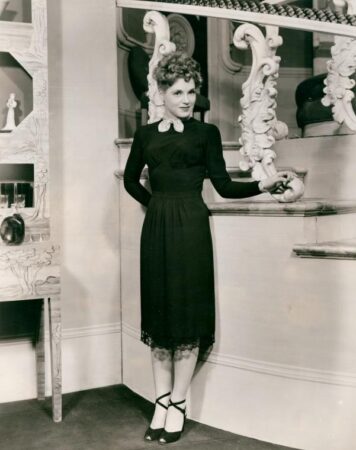
The success of Born Yesterday on Broadway ensured that the story was snatched up by Hollywood in a New York minute. It was Harry Cohn of Columbia Pictures who bought the rights as soon as he could. Harry then proceeded to test every single female actor he could find to be the screen’s Billie Dawn. He refused to cast Judy Holliday even though Garson Kanin wanted Judy. Director George Cukor wanted Judy. Everyone with sense wanted Judy. But Harry Cohn still refused. A plan was devised by Cukor and Kanin and Katharine Hepburn and Spencer Tracy who made sure Judy Holliday made a splash in their next picture, 1949’s Adam’s Rib. And she sure did by delivering a memorable performance as a wife accused of trying to murder her cheating husband. Adam’s Rib is a terrific battle of the sexes starring megastars Tracy and Hepburn, but Judy Holliday steals every scene she is in. With Holliday’s terrific reviews and gossip column mentions, Harry Cohn gave in and cast her as Billie Dawn in the movie. The result was a Best Actress Academy Award for Judy in a surprise but deserved win over powerhouses Bette Davie in All About Eve and Gloria Swanson in Sunset Boulevard.
The release of Born Yesterday to grand success would make any actor’s year, but Judy Holliday had much more going on than awards and glorious reviews. That same year Holliday’s name appeared in Red Channels: The Report of Communist Activities in Radio and Television. This was worrisome given Holliday’s family’s socialist beliefs and her support for civil rights and progressive causes. Judy was called to testify before the Senate Subcommittee on Internal Security in 1952 and did so as Billie Dawn in a fascinating turn of events that offer a glimpse of Judy Holliday’s character and smarts. For details about her testimony take a look at this informative article in Backlots.
In the end, no evidence was found against Judy Holliday, and she never named names. Although her career was not destroyed like that of so many others at the time, she did not perform on radio or television for almost three years.
During that entire Red Channels ordeal, Holliday made The Marrying Kind (1952) opposite Aldo Ray. Directed by George Cukor and written by Ruth Gordon and Garson Kanin, The Marrying Kind features a more subdued Judy Holliday than what she portrays in Born Yesterday or in other pictures that followed it, but her astute comedic timing is evident. By now audiences knew that all a movie needed was Judy Holliday. Despite her popularity, however, two years passed before they saw her again on the big screen in another infallible Cukor-Kanin-Holliday combination – with a twist.
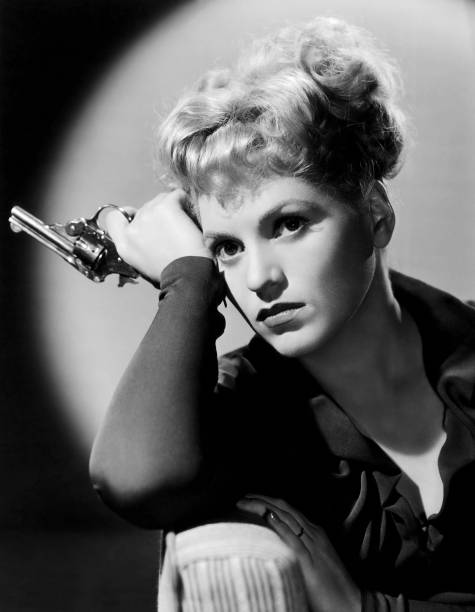
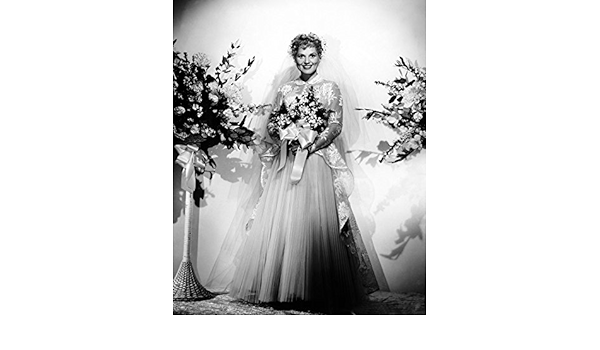
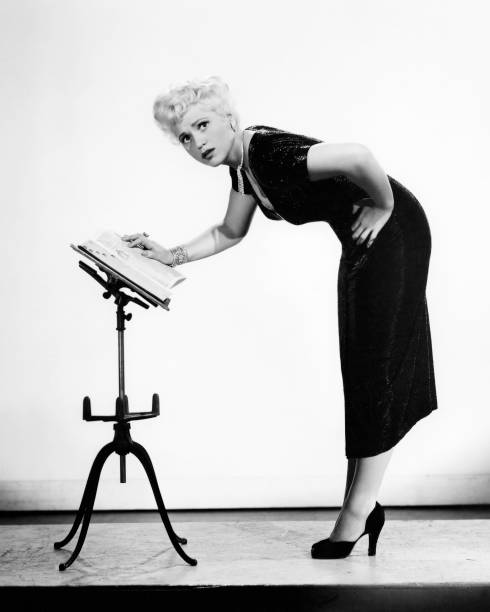
Like Judy Holliday, Jack Lemmon was born to act. The acting bug bit him quite early, in grammar school when he substituted for his friend Billy Tyler in a school play. Jack was nearly laughed off the stage for not knowing his lines and wearing Billy’s costume which was several sizes too big. Instead of humiliation, however, Jack felt pride. The laughter led to every opportunity to entertain classmates from then on with imitations and acting parts in many more plays.
Years later with a Harvard degree under his belt and having completed training in the Navy ROTC, Lemmon hit the New York City pavement looking for an agent. He earned money by playing the piano in a beer hall among other jobs and got his first break in radio. Jack did several off-off-off-off Broadway plays, which led to off-Broadway productions and later steady live TV work, which he loved. He could make a living with those productions and was working with great directors, producers and actors while honing his craft. In all Jack appeared in over 400 live TV productions. What he aspired to was a career on stage, however. Jack never wanted to go into movies, which he considered work for beautiful people, not real actors. Fate intervened, however, and Hollywood came calling. Jack Lemmon would soon change his mind about movie acting.

Lemmon was starring in a revival of Room Service in 1953 when Max Arnow, legendary Casting Director who was at Columbia Pictures at the time went to see the show. Columbia was looking for a guy to play opposite Judy Holliday in It Should Happen to You (a movie title Jack always disliked). Jack’s interest in movies increased when he heard the names associated with the picture, George Cukor, Garson Kanin, and Judy Holliday.
Jack got to Hollywood, his first trip to the movie capital, expecting to spend time with Cukor and Holliday, or at least see them at the test. But neither Cukor nor Holliday were around. When Jack got to Columbia, Max Arnow arranged for him to test with two writers who were handy, Blake Edwards and Richard Quine. It was during a subsequent Hollywood visit, as It Should Happen to You prepared for production, that Jack met and got to know Judy Holliday.
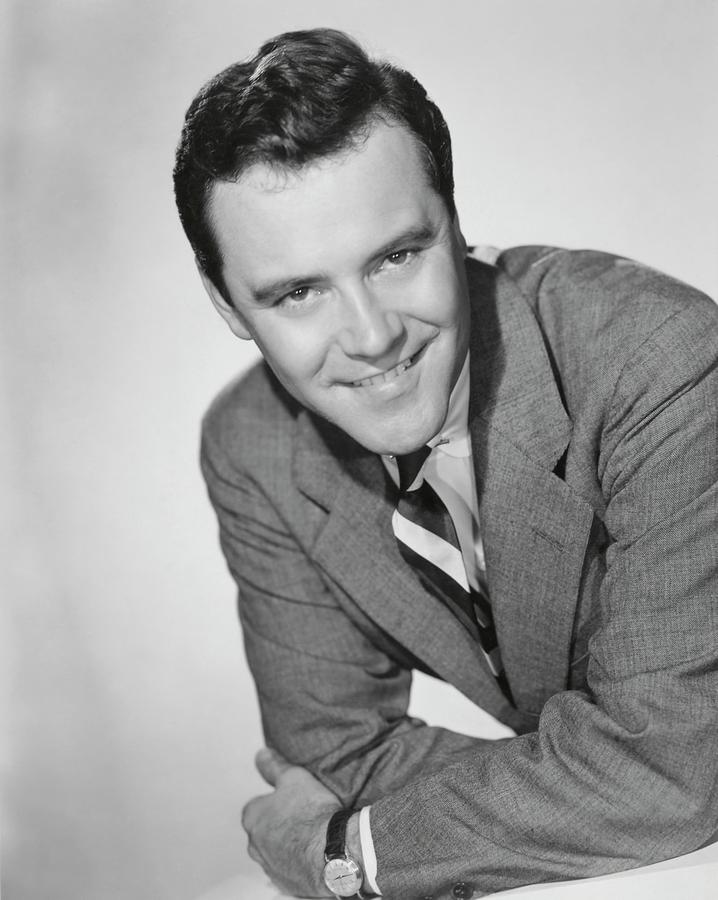
As Jack told it, he invited Judy to dinner one evening and she accepted. Jack rented a car and picked Judy up at the house she was renting. While up in the hills heading toward a restaurant in the Valley that friends had recommended, Jack’s rented car got a flat tire. Jack couldn’t believe it and thought the only option was to leave Judy in the car while he walked down the hill to find a garage. He did that, told Judy to lock the doors and wait. Judy locked the doors and waited. Jack started down but soon realized the winding hill was a lot longer than he had expected. He then got another idea – he would return to the car and let it glide down the hill toward the closest garage. Up the steep hill he went, finally arriving at the car where Judy waited. She opened the door and as Jack climbed into the driver’s seat she asked him for a handkerchief, which he provided. She began to run her hands. “Where’s that dirt from?” Jack asked, “from changing the tire,” Judy casually replied. It had never occurred to Jack to do that.
Jack Lemmon was excited to start his first picture despite having a verbal tug-of-war with Harry Cohn over the name Lemmon. Jack was born John Uhler Lemmon and he intended to keep his last name intact. Cohn was afraid “Lemmon” could easily be used as “Lemon” if critics wanted to pan the movie. Jack stood his ground and Jack Lemmon it remained for numerous TV appearances, stage work, and sixty-nine movies.
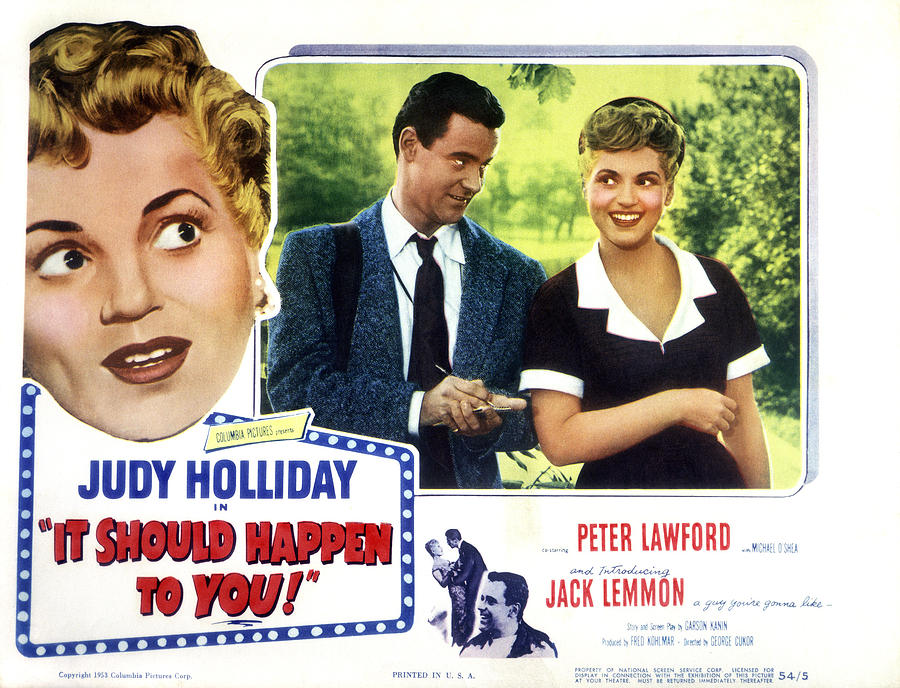
It Should Happen to You tells the story of Gladys Glover (Judy Holliday), a young woman who dreams of having a famous name. That is why Glad had moved to New York and two years later she had nothing but $1,000 in the bank to show for it. Having just been fired from her job as a girdle model, Gladys is walking around Central Park one day when she meets documentary filmmaker Peter Sheppard (Lemmon). The two hit it off and Gladys tells Pete all about her dream to be famous as he films her and the park surroundings.

Not surprisingly, Pete instantly falls for Gladys. She is beautiful, quirky, and funny. Pete and Gladys part ways but not before he makes an impression on her by kissing her hand as he says goodbye. Gladys is feeling a bit lost as she continues to walk through the park alone when she notices a giant billboard that is for rent. Perking up immediately Gladys goes to the rental office with cash in hand and rents the billboard. Before you know it, Gladys Glover is now prominently displayed at the entrance to Central Park at Columbus Circle and that begins the entire affair.
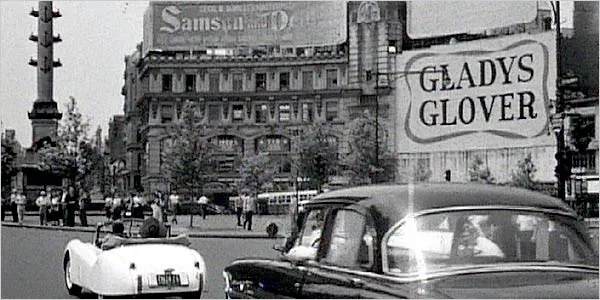
While Gladys Glover enjoys spending time staring at the sign bearing her name outside Central Park, Evan Adams III (Peter Lawford), who owns the Adams Soap company, is complaining to the sign renter about his having rented the sign for the soap company every summer. Adams decides the only way to solve the dilemma is to meet with Gladys to convince her to give up the sign. Except Adams does not understand what the sign means to Gladys Glover and the only way he is able to convince her is to offer her six signs placed all over New York City in exchange for the one by Central Park. Now subway riders, pedestrians, shoppers, you name it, are seeing Gladys Glover as they go about their daily business. They haven’t a clue who or what Gladys Glover stands for but when Gladys says her name in Macy’s one day everyone surrounds her for her autograph. Gladys’ dream of fame has come true. She is famous for being famous. As the idiom says, however, be careful what you ask for.
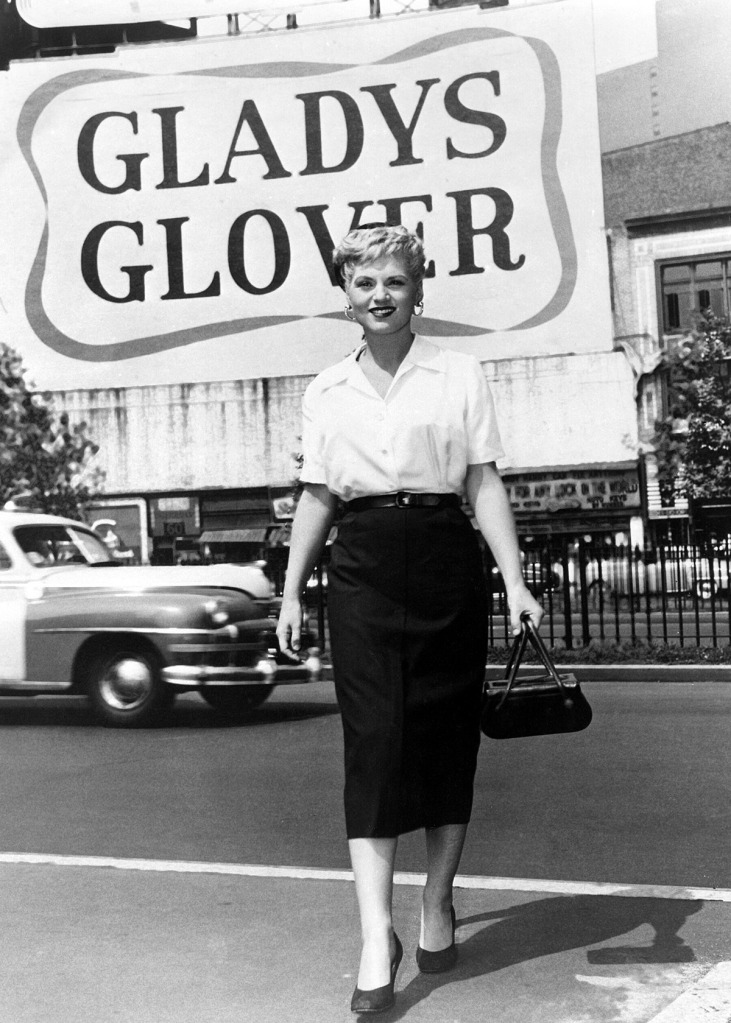
Gladys is so famous she stars on television commercials – but she starts to hate it. The Adams Soap company, who has signed Gladys to use her as the average American girl, does not portray her in a positive light. Gladys enjoys being somebody for a while, but the work and ridiculous circumstances they put her in are too much for her to take. Add to that Evan Adams trying to seduce her, which Gladys evades directly in that way Judy Holliday had of circling so one thinks she doesn’t know what she’s talking about but ends up making a brilliant statement with pinpoint accuracy.
Meanwhile, Pete, who got Gladys’ address at the park that day, moved into Gladys’ apartment building to be close to her. The two forge a friendship but Pete has something else in mind, which is why Gladys’s obsession with being famous annoys him to no end. As her fame grows so does Pete’s frustration and anger.
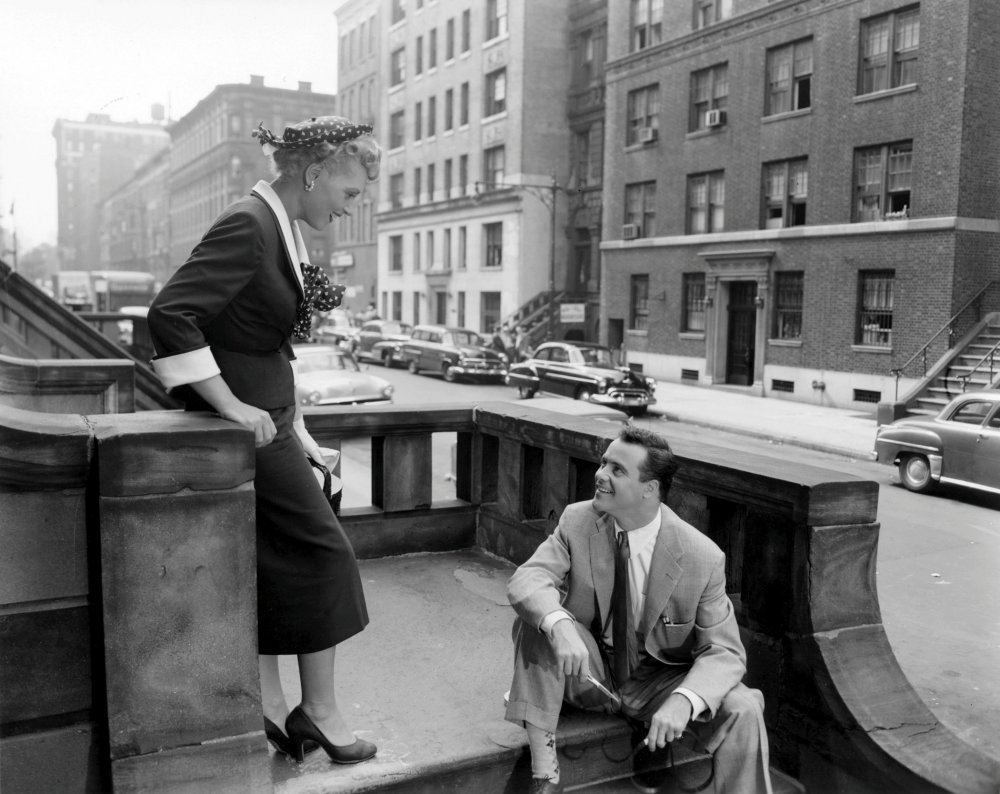
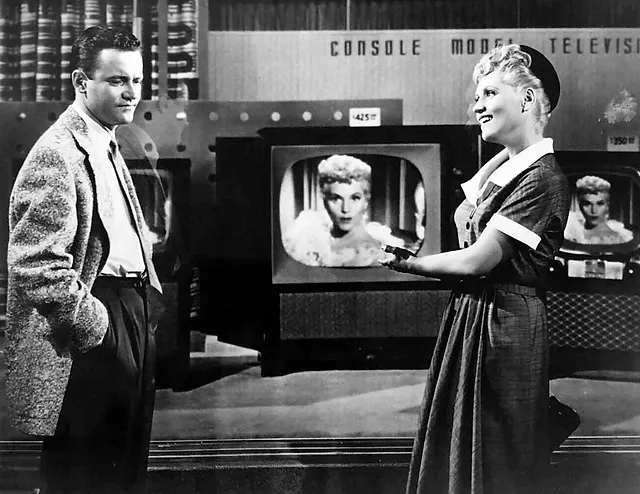
The final straw for Pete is seeing Gladys leave with rich playboy Adams for what she believes is a business conference. In a favorite sequence in the film, Pete cannot believe Gladys is readying for her business outing with the other guy ignoring the fact that his parents have been preparing to make dinner for Gladys for a week. The two leave Gladys’ apartment in a huff and she proceeds to stomp down the stairs only to climb them again, and again, to try to make Pete understand her predicament, “but it’s business” she says. He does not budge, and an irritated Gladys finally leaves. The scene is testament to Judy Holliday’s talent for physical comedy and it is a hoot.
Anyway, poor Pete knows he cannot compete with the likes of Evan Adams, so he decides to leave Gladys alone saying his formal goodbyes with a note and instructions left in her apartment. Gladys is to follow the steps he has laid out, turn on the movie projector and watch the documentary Pete made for her. As Gladys watches, she sees images of her in the park the day they met and hears Pete profess his love. Gladys is moved to tears and so am I. She rushes to Pete’s apartment to find out he has left. She loves Pete right back, you see, and is now desperate for him. Do not fret. As is required in these stories, Gladys and Pete find their way back to each other and in as charming a way as one could devise.

It Should Happen to You is a simple, delightful romantic comedy with a premise that is well ahead of its time. I mean, who should have inmagined the outrageous premise of people becoming famous for doing nothing? The movie is also a delight. Judy Holliday alone makes it well worth your time but add Jack Lemmon to the mix and it is a sure-fire winner. They are extremely compatible, likeable people you cannot help but root for, evident from this first outing together. Judy and Jack are rarities, actors who could make you laugh and make you cry with equal aplomb and often in comedies where they catch you and your emotions off-guard.
Jack Lemmon was lucky to also make his second movie with Judy Holliday. Another comedy and another hit, Phfft, directed by Mark Robson also released in 1954. I cannot help but think some of Judy’s acting chops rubbed off on the fledgling movie actor. So much so in fact that I considered titling this entry It Should Happen to Jack Lemmon with the It being Judy Holliday. In some ways Holliday exemplified what Jack came to be admired for, the everyman who moves you to pieces. Judy did that at every turn. I believe that if there is a male actor that comes close to Holliday in style and likability it is Jack Lemmon and at least some of that may be because he picked up a few things from Judy.
Both Judy and Jack had musical talent as well, which they demonstrate in It Should Happen to You with a lovely rendition of Koehler and Arlen’s Let’s Fall in Love. I can barely stop smiling as these two perfectly matched people do their thing whether it is their physical comedy, the way Holliday inflects her voice when exasperated, Jack’s own quirkiness, or their compatibility as a couple with each possessing an innocence that melts your heart, they get to you. Please do fall in love.


Of working with Judy Holliday Jack said, “it was wonderful. She was a delight and one of the most intelligent people and actors I’ve ever worked with. She loved word games and I’m pretty sure she invented scrabble.”
Judy Holliday’s all-too-short career was already winding down by the time she collaborated with Jack Lemmon. She made Richard Quine’s The Solid Gold Cadillac and Full of Life in 1956 and, following a Lead Actress Tony Award win for Bells Are Ringing on Broadway, Holliday made the screen version directed by Vincente Minnelli in 1960, her final film. Her last stage appearance was in the political satire Hot Spot, which had a brief run in 1963. Judy died of breast cancer in 1965 at the age of forty-three, a great loss for us all.
In contrast to Holliday’s career, Jack Lemmon’s hit a stride that lasted six decades, garnered him two Academy Awards, Lifetime Achievement Awards in Comedy and the American Film Institute, and too many other accolades to list. Remarkably Jack was a hit from his very first picture and it is a rarity that any actor should get such a meaty role as Pete Sheppard in his first movie. That is not to say Jack hadn’t a lot to learn in 1954. He often told of how George Cukor kept yelling for him to do “LESS!” and “LESS!” over and over again during the making of It Should Happen to You. “What do you want me to stop acting?” Jack asked to which Cukor replied, “Now you got it!” Still, Columbia was confident audiences would respond positively to Jack Lemmon because they said it in all the movie’s ads and posters, ‘and Introducing Jack Lemmon, a guy you’re gonna like.’ And were they ever right.
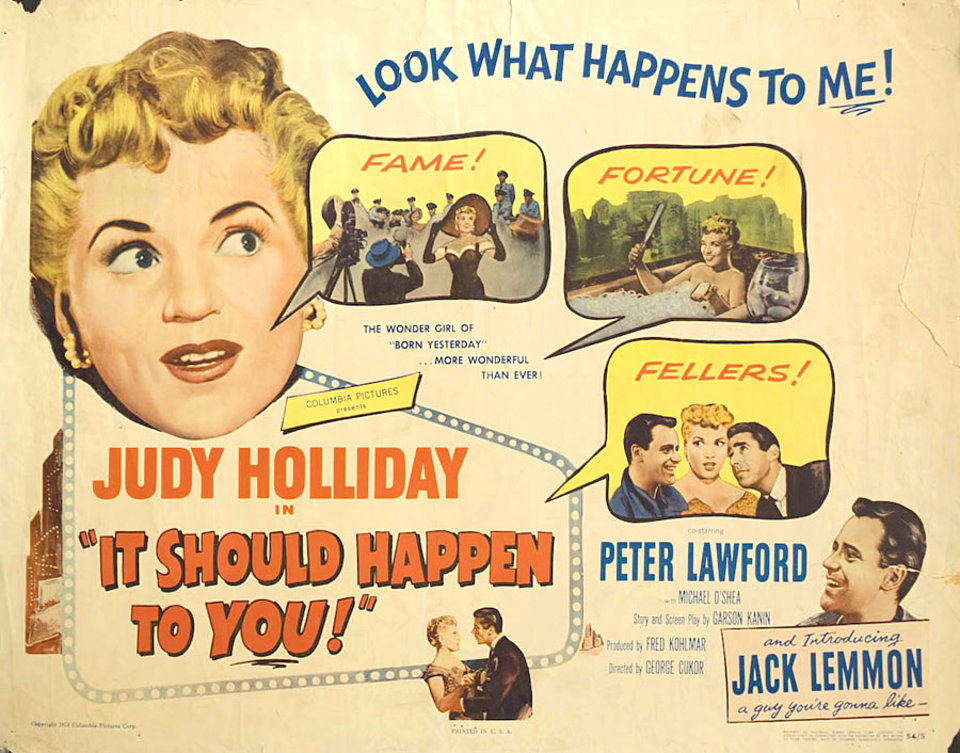
____________________________________________
This entry is a submission to the Classic Movie Blog Association’s spring blogathon, Screen Debuts & Last Hurrahs. I am heading right over to read other stories of our favorite stars and directors. I wish you the same good fortune.

Billy Wilder said that happiness is working with Jack Lemmon. Not to slap down Billy, but may I add that happiness is watching jack Lemmon and reading about Jack Lemmon. Great post about a great star whose talent sometimes was disguised by his overwhelmingly likeable personality.
Thank you for stopping by and your spot-on comment about Jack. Wish I’d known him.
I can’t get enough of Jack Lemmon. Equally adept at drama and comedy. It’s always such an absolute joy to watch him work. Judy was incredible too and it’s awful we lost her so young. Great piece.
You’d never know Jack Lemmon was new to movies in It Should Happen To You. The camera loves him, and he seems completely natural. Plus, he has such lovely chemistry with Judy Holliday. Time to see this film again!